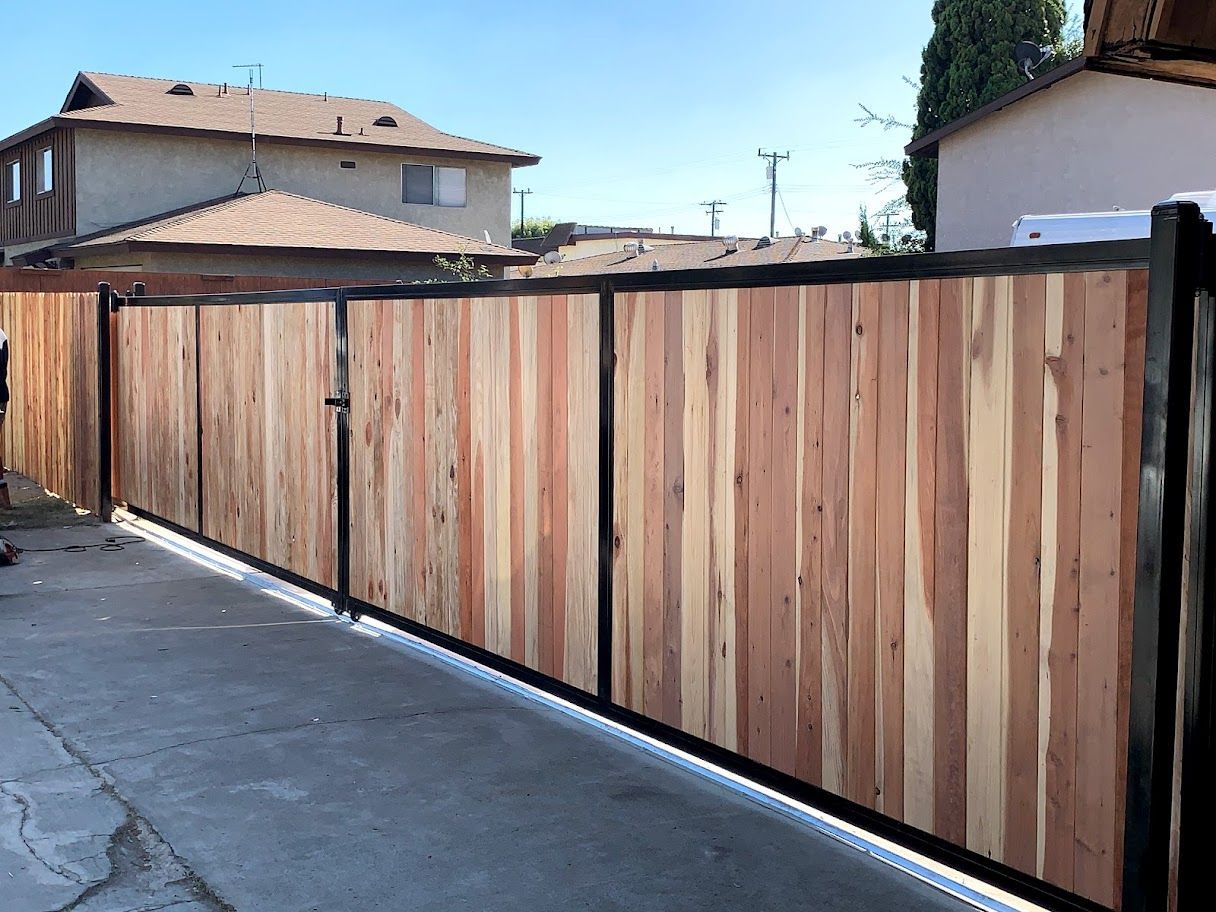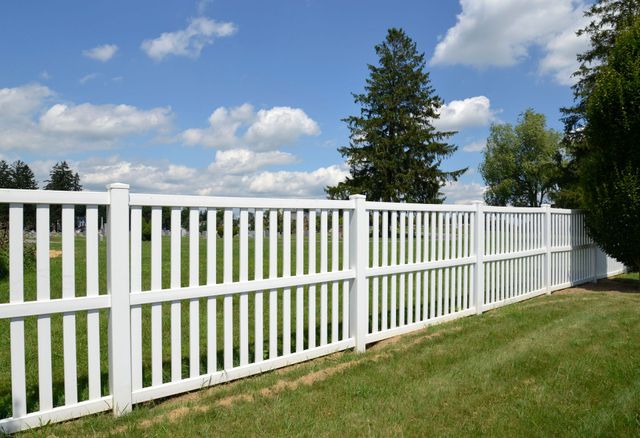All Categories
Featured
When selecting a fencing for your building, it's necessary to take into consideration elements like cost, longevity, upkeep, and visual appeal. 3 of one of the most prominent materials for property and business fences are timber, light weight aluminum, and vinyl. Each offers distinct advantages and some drawbacks, making it crucial to evaluate your requirements before choosing. Below, we contrast the pros and disadvantages of these products to assist guide your selection.
Wood Secure Fencing. Pros:
![]()
Natural Visual: Timber fencings are known for their classic, natural appearance. They can easily mix into most landscapes and enhance the beauty of your home or service. Whether you're intending for a rustic appearance or an extra sleek coating, timber can be tailored with paint, discolor, or sealant. Modification: Wood is just one of one of the most versatile products, enabling a wide range of styles, such as picket fencings, personal privacy fences, and ranch-style units. It's simple to change the style to fit the particular needs of your residential property. Budget friendly: Normally, wood fences come at a lower initial expense contrasted to plastic or light weight aluminum, making them a cost-effective alternative for those on a budget plan. Disadvantages:
Maintenance Needs: Wood fencings require routine upkeep to preserve their beauty and performance. This includes discoloration or painting to protect against rot, termites, and climate damages. Without proper treatment, timber can weaken in time. Shorter Life-span: Contrasted to plastic or aluminum, timber fences often tend to have a much shorter life expectancy, specifically in areas with extreme climate. Rough conditions, such as heavy rainfall, moisture, or snow, can create timber to deteriorate much more rapidly. Prone to Damage: Wood fences are prone to damage from insects, consisting of termites, in addition to natural wear from weather. They may additionally warp or fracture otherwise appropriately maintained. Vinyl Secure fencing. Pros:
Low Upkeep: One of the major benefits of plastic fencings is that they require marginal maintenance. Unlike wood, plastic doesn't require to be repainted, secured, or discolored. It's immune to fading, staining, and breaking, which saves money and time on maintenance. Durability: Vinyl is known for its capability to hold up against severe weather without degrading. It's unsusceptible parasites like termites, and its resistance to dampness and UV rays guarantees it remains looking great for numerous years. Long-Lasting: A vinyl fencing can last up to three decades or more, making it a fantastic long-term investment. Lots of manufacturers use guarantees, even more improving its value. Variety of Styles: Plastic fencings are readily available in different colors and designs, including those that resemble timber. You can pick from privacy, picket, or decorative styles, giving adaptability to match your home or business. Disadvantages:
![]()
Higher Upfront Cost: Plastic fences tend to have a higher initial cost than wood. While the long-lasting financial savings on upkeep are considerable, the ahead of time financial investment might be a deterrent for some house owners. Restricted Personalization: Plastic fencings can be found in standard layouts, and while designs and shades are different, you may not have as much flexibility for personalization contrasted to wood. Breaking in Cold Climates: While vinyl is resilient, in exceptionally cool climates, it can end up being breakable and split upon impact, which could be bothersome in locations with extreme winter seasons. Light weight aluminum Secure fencing. Pros:
Reduced Upkeep: Aluminum fencings are understood for their low-maintenance requirements. Unlike timber, aluminum doesn't rust or corrode, and it does not need to be repainted or sealed. This makes it an excellent option for those that desire a convenient alternative. Sturdiness and Toughness: Aluminum is a robust product that stands well to rough climate condition. It's a superb option for seaside areas where saltwater deterioration is a concern, as it's resistant to corrosion. Aesthetic Charm: Light weight aluminum fences provide a clean, elegant look, frequently used for attractive objectives. They're readily available in different designs, consisting of ornamental styles, and can include a high-end feel to your property. Safety and security: Light weight aluminum fences are resilient and deal fantastic safety and security, specifically when set up with locks or entrances. Their durable building supplies a reputable barrier versus undesirable entry. Disadvantages:
![]()
Greater Initial Expense: Aluminum fencings often tend to be a lot more expensive than wood, particularly if you choose for attractive styles. The in advance price may be excessive for some. Much Less Personal privacy: Light weight aluminum fences typically have larger spaces in between the slats, which means they provide much less personal privacy than wood or vinyl fencings. Aluminum might not be the best choice if seclusion is a priority. Nicking Issues: While aluminum is rust-resistant, it is prone to denting or flexing if struck with pressure. For example, a car mishap or hefty influence can cause long lasting damages to the fence. Which Fence Product is Right for You? Selecting the ideal fencing depends upon numerous factors, including your spending plan, design choices, maintenance ability, and the setting in which you live. If you want a natural look and are gotten ready for routine maintenance, timber might be the right alternative. Plastic is a fantastic choice if low-maintenance and long life are your concerns. For those who choose a sleek, modern look with minimal care, aluminum provides a durable, secure option.
Inevitably, each fencing material has its pros and cons, so it is very important to review what matters most for your specific needs. Take into consideration the environment, the degree of privacy you require, and just how much upkeep you want to dedicate to, and you'll find the best fence for your home.
Wood Secure Fencing. Pros:

Natural Visual: Timber fencings are known for their classic, natural appearance. They can easily mix into most landscapes and enhance the beauty of your home or service. Whether you're intending for a rustic appearance or an extra sleek coating, timber can be tailored with paint, discolor, or sealant. Modification: Wood is just one of one of the most versatile products, enabling a wide range of styles, such as picket fencings, personal privacy fences, and ranch-style units. It's simple to change the style to fit the particular needs of your residential property. Budget friendly: Normally, wood fences come at a lower initial expense contrasted to plastic or light weight aluminum, making them a cost-effective alternative for those on a budget plan. Disadvantages:
Maintenance Needs: Wood fencings require routine upkeep to preserve their beauty and performance. This includes discoloration or painting to protect against rot, termites, and climate damages. Without proper treatment, timber can weaken in time. Shorter Life-span: Contrasted to plastic or aluminum, timber fences often tend to have a much shorter life expectancy, specifically in areas with extreme climate. Rough conditions, such as heavy rainfall, moisture, or snow, can create timber to deteriorate much more rapidly. Prone to Damage: Wood fences are prone to damage from insects, consisting of termites, in addition to natural wear from weather. They may additionally warp or fracture otherwise appropriately maintained. Vinyl Secure fencing. Pros:
Low Upkeep: One of the major benefits of plastic fencings is that they require marginal maintenance. Unlike wood, plastic doesn't require to be repainted, secured, or discolored. It's immune to fading, staining, and breaking, which saves money and time on maintenance. Durability: Vinyl is known for its capability to hold up against severe weather without degrading. It's unsusceptible parasites like termites, and its resistance to dampness and UV rays guarantees it remains looking great for numerous years. Long-Lasting: A vinyl fencing can last up to three decades or more, making it a fantastic long-term investment. Lots of manufacturers use guarantees, even more improving its value. Variety of Styles: Plastic fencings are readily available in different colors and designs, including those that resemble timber. You can pick from privacy, picket, or decorative styles, giving adaptability to match your home or business. Disadvantages:

Higher Upfront Cost: Plastic fences tend to have a higher initial cost than wood. While the long-lasting financial savings on upkeep are considerable, the ahead of time financial investment might be a deterrent for some house owners. Restricted Personalization: Plastic fencings can be found in standard layouts, and while designs and shades are different, you may not have as much flexibility for personalization contrasted to wood. Breaking in Cold Climates: While vinyl is resilient, in exceptionally cool climates, it can end up being breakable and split upon impact, which could be bothersome in locations with extreme winter seasons. Light weight aluminum Secure fencing. Pros:
Reduced Upkeep: Aluminum fencings are understood for their low-maintenance requirements. Unlike timber, aluminum doesn't rust or corrode, and it does not need to be repainted or sealed. This makes it an excellent option for those that desire a convenient alternative. Sturdiness and Toughness: Aluminum is a robust product that stands well to rough climate condition. It's a superb option for seaside areas where saltwater deterioration is a concern, as it's resistant to corrosion. Aesthetic Charm: Light weight aluminum fences provide a clean, elegant look, frequently used for attractive objectives. They're readily available in different designs, consisting of ornamental styles, and can include a high-end feel to your property. Safety and security: Light weight aluminum fences are resilient and deal fantastic safety and security, specifically when set up with locks or entrances. Their durable building supplies a reputable barrier versus undesirable entry. Disadvantages:

Greater Initial Expense: Aluminum fencings often tend to be a lot more expensive than wood, particularly if you choose for attractive styles. The in advance price may be excessive for some. Much Less Personal privacy: Light weight aluminum fences typically have larger spaces in between the slats, which means they provide much less personal privacy than wood or vinyl fencings. Aluminum might not be the best choice if seclusion is a priority. Nicking Issues: While aluminum is rust-resistant, it is prone to denting or flexing if struck with pressure. For example, a car mishap or hefty influence can cause long lasting damages to the fence. Which Fence Product is Right for You? Selecting the ideal fencing depends upon numerous factors, including your spending plan, design choices, maintenance ability, and the setting in which you live. If you want a natural look and are gotten ready for routine maintenance, timber might be the right alternative. Plastic is a fantastic choice if low-maintenance and long life are your concerns. For those who choose a sleek, modern look with minimal care, aluminum provides a durable, secure option.
Inevitably, each fencing material has its pros and cons, so it is very important to review what matters most for your specific needs. Take into consideration the environment, the degree of privacy you require, and just how much upkeep you want to dedicate to, and you'll find the best fence for your home.
Latest Posts
Check Out Brake Repair & More: Comprehensive Auto Care Solutions from Montclare Auto Repair
Published en
1 min read
Unlock WyHy Federal Credit Union – Wyoming’s Best Banking Choice for Your Money Goals
Published en
1 min read
Join Your Financial Partner at WyHy – Top Benefits for Your Goals
Published en
1 min read
More
Latest Posts
Check Out Brake Repair & More: Comprehensive Auto Care Solutions from Montclare Auto Repair
Published May 28, 25
1 min read
Unlock WyHy Federal Credit Union – Wyoming’s Best Banking Choice for Your Money Goals
Published May 26, 25
1 min read
Join Your Financial Partner at WyHy – Top Benefits for Your Goals
Published May 25, 25
1 min read